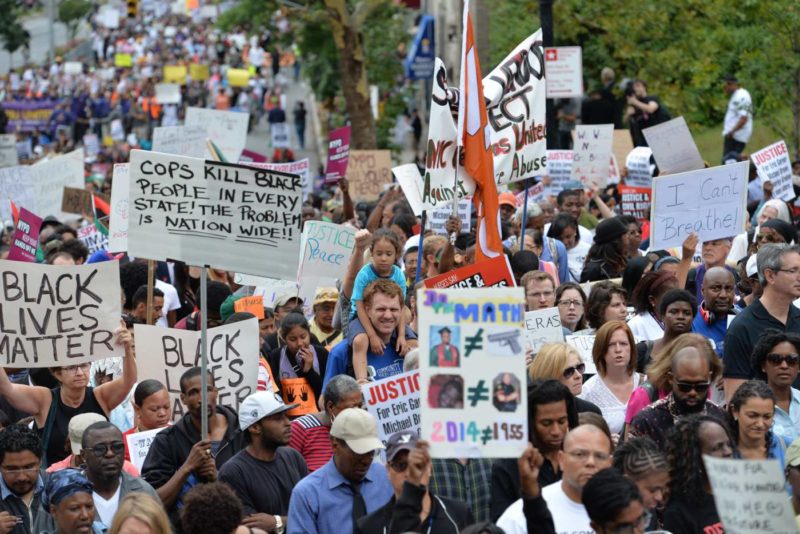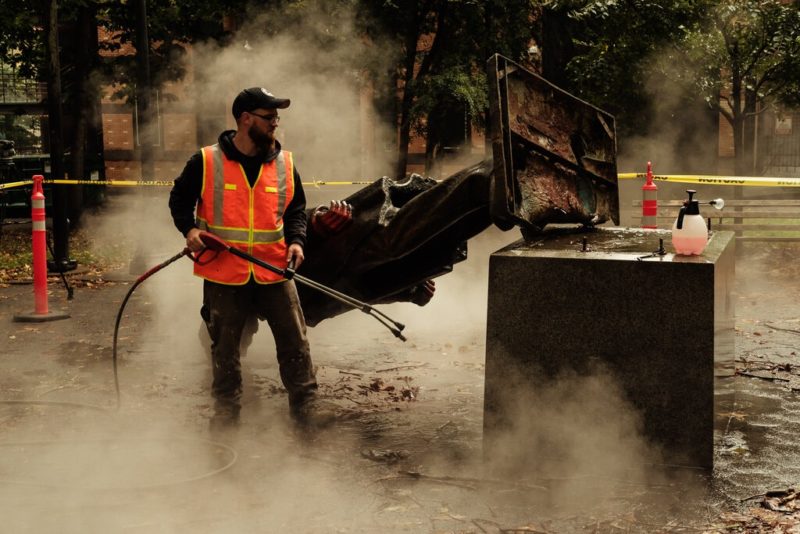Special News Series: Rising Up For Justice! – Protesters in Portland Topple Statues of Lincoln and Roosevelt
Share
Explore Our Galleries
Breaking News!
Today's news and culture by Black and other reporters in the Black and mainstream media.
Ways to Support ABHM?
Introduction To This Series:
This post is one installment in an ongoing news series: a “living history” of the current national and international uprising for justice.
Today’s movement descends directly from the many earlier civil rights struggles against repeated injustices and race-based violence, including the killing of unarmed Black people. The posts in this series serve as a timeline of the uprising that began on May 26, 2020, the day after a Minneapolis police officer killed an unarmed Black man, George Floyd, by kneeling on his neck. The viral video of Floyd’s torturous suffocation brought unprecedented national awareness to the ongoing demand to truly make Black Lives Matter in this country.
The posts in this series focus on stories of the particular killings that have spurred the current uprising and on the protests taking place around the USA and across the globe. Sadly, thousands of people have lost their lives to systemic racial, gender, sexuality, judicial, and economic injustice. The few whose names are listed here represent the countless others lost before and since. Likewise, we can report but a few of the countless demonstrations for justice now taking place in our major cities, small towns, and suburbs.

To view the entire series of Rising Up for Justice! posts, insert “rising up” in the search bar above.
Protesters in Portland Topple Statues of Lincoln and Roosevelt
The demonstrations highlighted a mass execution overseen by President Lincoln and also targeted Theodore Roosevelt.
By Mike Baker, New York Times
SEATTLE — Protesters in Portland, Ore., swept through the city on Sunday night, toppling statues of Abraham Lincoln and Theodore Roosevelt and damaging the entrance to the Oregon Historical Society in a demonstration against colonization and the treatment of Native Americans.
Protests around the country this year have mainly targeted statues featuring slave owners and symbols of the Confederacy, but the demonstrators in Portland focused on the former presidents as part of a protest billed as an “Indigenous Peoples Day of Rage.”…
Lincoln has long been celebrated as the president who brought an end to slavery in the United States, but the protesters sprayed the base of his statute in Portland with “Dakota 38” — a reference to the largest mass execution in U.S. history, in which 38 Dakota Indians were sent to the gallows in 1862, accused of killing settlers in raids.

Lincoln had signed the execution order. He had also expressed worry about the rapid speed and lack of evidence presented at military tribunals that led to the death sentences; he commuted the sentences of 265 others who had been tried.
Roosevelt, meanwhile, has been scrutinized over his opinions about racial hierarchy and his role in the Spanish-American War.
Protests in Portland have persisted in the months since Minneapolis police officers killed George Floyd in May, sparking nationwide protests for racial justice and against police brutality. While much of the focus of demonstrations has been on how Black people have been harmed, the protests have at times highlighted other causes, including the need for societal reforms to address transgender rights, economic disparities and Native Americans.
Read the full article here.
More Breaking News here.
More about the connection between the histories of Indigenous Peoples in the US and African Americans here and here.









Comments Are Welcome
Note: We moderate submissions in order to create a space for meaningful dialogue, a space where museum visitors – adults and youth –– can exchange informed, thoughtful, and relevant comments that add value to our exhibits.
Racial slurs, personal attacks, obscenity, profanity, and SHOUTING do not meet the above standard. Such comments are posted in the exhibit Hateful Speech. Commercial promotions, impersonations, and incoherent comments likewise fail to meet our goals, so will not be posted. Submissions longer than 120 words will be shortened.
See our full Comments Policy here.